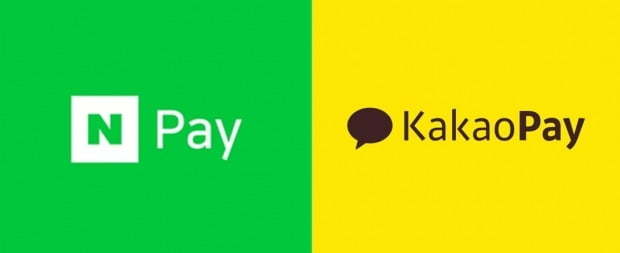With politicians and regulators joining forces to strengthen monitoring of fast-growing IT platforms, shares of South Korea’s two tech giants plummeted Thursday, losing a combined 19 trillion won ($16.2 billion) in just two days.
Naver, the country’s third-largest company by market capitalization, declined 2.56 percent, or 10,500 won, to close at 399,000 won Thursday, adding to a 7.87 percent fall recorded the previous day. Kakao plummeted 7.22 percent to 128,500 won after losing 10.06 percent Wednesday. With the two-day slide, Kakao gave its title of the fourth-largest heavyweight to Samsung Biologics. The benchmark Kospi on the same day dropped 1.53 percent to 1,034.62 points.
The unexpected fall of shares of the two companies came immediately after an announcement by financial authorities that they would start regulating sales of financial products on their platforms.

The Financial Services Commission and Financial Supervisory Service on Tuesday said selling financial products on internet platforms without an intermediary license goes against the Financial Consumer Protection Act. The authorities said sales of financial products on their platform are considered an act of intermediation, not mere advertisement as fintech companies claim. The FCPA was enacted in March and its grace period ends Sept. 24, by which affected companies should halt or alter their services.
The decision came on the same day the ruling party held a hearing on IT firms’ dominance in online markets. Lawmakers claimed that Kakao has been taking high commission fees from small and medium-sized companies and retailers as well as services to customers by “exploiting” its own platform. Cheong Wa Dae, for its part, said it would discuss the matter closely with Parliament.
The negative impact on share prices reflects mounting concerns over tightening regulations on big IT companies that are growing in influence in various fields, ranging from mobility to commerce to finance.
“Some investors think that this is just the beginning of further regulations, which will increase uncertainty for IT platform companies,“ said Kim Hyun-yong, an analyst at Hyundai Motor Securities, adding that the share price decline was boosted by such concerns and were excessive.
The FSC’s move also clouded prospects for Kakao Pay, which is scheduled to go public on Oct. 14.
The fintech arm of Kakao was originally planning to list in August but was asked by the FSS to modify its IPO price range. The company submitted a renewed application with its price range adjusted from a band of between 63,000 won and 96,000 won to between 60,000 won and 90,000 won before the new regulation was introduced. Some market watchers see that latest measures might dampen investors’ expectation on the fintech firm’s IPO.
“In the short term, (the regulation) would have limited impact on the performance of Naver and Kakao. In the long term, additional restrictions and new regulations on other business areas could have a negative impact on platforms’ potential expansion,” wrote Kim So-hye, an analyst at Hanwha Investment and Securities.
Meanwhile, executives of fintech companies including Naver Pay, Kakao Pay and Toss convened with financial officials Thursday afternoon. Financial authorities sought to downplay concerns that the measures were targeting online platforms, while fintech companies expressed worries and promised to abide by the law.
“This is not to limit the operation of certain online platforms. Rather, we’re providing guidelines for sales of financial products in accordance with the FCPA,” said an official in attendance who requested anonymity.
“Kakao Pay has been improving our services under the guidance of financial authorities since early this year, and we will do our best to resolve financial authorities’ concerns before the grace period for the FCPA ends,” Kakao Pay said in a statement on Thursday.
(
gypark@heraldcorp.com)








